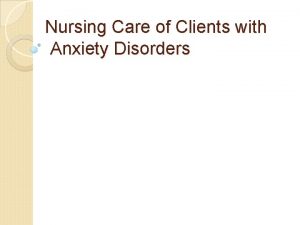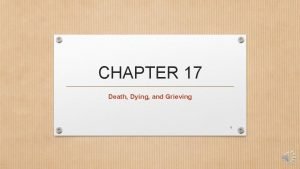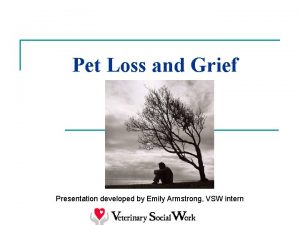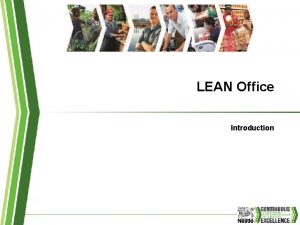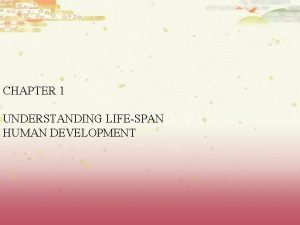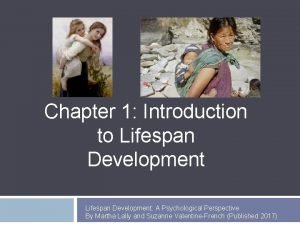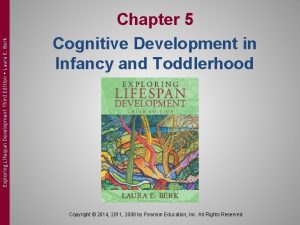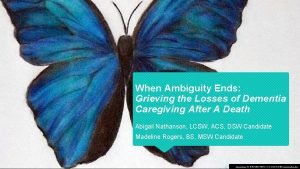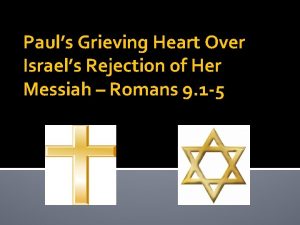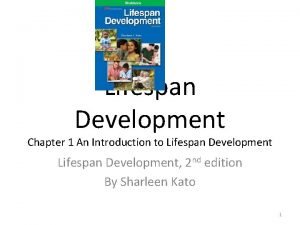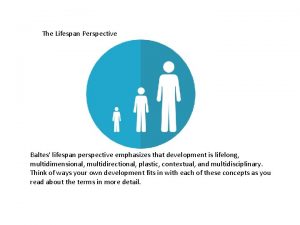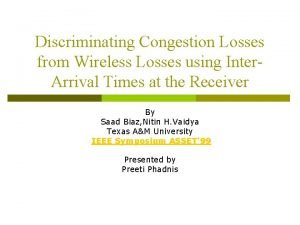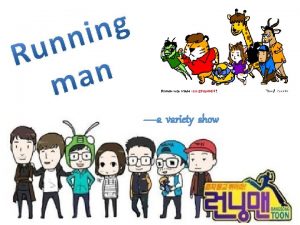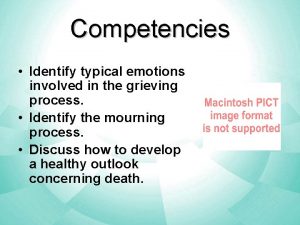Grieving a Variety of Losses over the Lifespan



























- Slides: 27

Grieving a Variety of Losses over the Lifespan Katie Kostohryz, Ph. D, Licensed Professional Counselor Associate Teaching Professor at Penn State PSU Herr clinic supervisor at SCASD Counselor Education; Rehabilitation & Human Services kzk 18@psu. edu

Objectives & initial questions • Identify and acknowledge a variety of losses, death and non-death related. • Understand unique needs of of grieving individuals and families across the lifespan. • Explore creative ways to express grief in our home, community & schools. Questions submitted: • What are individual and group supports family members with illnesses or disability, pet loss, separation or divorce, death, etc. for my kids and for myself? • What role do sports or physical activities have in the grief process?

• Loss is the real or perceived deprivation of something (or someone) deemed meaningful. Grief & Loss Definition from: Humphrey, K. M. (2009). Counseling strategies for loss and grief. American Counseling Association. • Grief is unique for each person. It’s a multidimensional experience to a loss. Responses can be emotional, interpersonal, cognitive, physical, behavioral, social, cultural, spiritual, and/or historical.

• Natural/man made disasters/terrorism/pandemics • Trauma/illness/disability/addiction/mental health • Divorce/separation/relationship ending Different types of losses… • Estrangement, loss of contact with family, friends, partners • Infertility/miscarriage/abortion • Loss of freedom/independence/sense of safety/ security/control/hopes and dreams • Loss of community/connection/ competence/self esteem/peace of mind • Loss of job/career changes by choice/loss of title/status • Transitions/role changes/loss of friends/loss of daily routines • Loss of graduation, seasons, events, milestones, academics, school year • Immigration/relocation/Re-entry after war, travel, or school • Cultural loss, loss of language, loss of objects • Loss of normalcy, everyday routine, motivation • Loss of life as we knew it, loss of old world, old way of being • Pet loss • Loss of faith, in people, the world • Change is loss, not knowing

• Primary loss- initial loss Types of losses • Secondary losses • Follow the primary loss, often overlooked • Loss of identity, loss of trust, loss of support systems & friends, loss of faith, loss of hopes & dreams, loss of finances, loss of status, loss of communication. . • Can be as or more impactful as the primary • Anticipatory loss -what is to come • Obscured loss -unaddressed or unrecognized loss overlooked due to survival, not knowing it was a loss, or for other reasons

Types of losses • Ambiguous Loss • uncertain, intangible, lack of rituals and rites • loss or change in relationship with someone still living • Psychologically present yet physically absent • COVID, adoption, child or parent in divorce, incarceration, military, empty nest, cut off & estrangement, friends or partnerships ending. • Physically present yet psychologically absent • Alzheimer’s, mental health, substance use or addiction, primary caregiver consumed with their own grief or with work. . • Pauline Boss: https: //www. ambiguousloss. com/

• Hierarchy of losses • Stigmatized loss • labeled shameful because of societal norms • substance use related deaths, HIV/AIDS, suicide Types of losses • Disenfranchised loss & grief • loss that can not be openly grieved, supported or acknowledged, absence of a ritual or denial to one • Griever is not socially recognized • age (youth & aging adults), ability or disability • A relationship is not recognized as legitimate • LGBTQA, “just a” friend, not married or partnered for that long, didn’t know them “that” well • Not socially recognized as a legitimate loss • systemic oppression and marginalization, cultural losses, historical unresolved trauma, pet loss, infertility, abortion, adoption, foster care • Self-disenfranchisement of your own losses“shoulds”

● Beyond the 5 stages (Kubler-Ross, 1969) ● Denial, Anger, Bargaining, Depression, Acceptance ● Finding Meaning, The Sixth Stage of Grief-D. Kessler A few theories on grief. . ● Dual process: loss coping vs restoration coping ● Loss adaptation and strategies as opposed to “coping”: ● Affective (emotional expression, affective regulation) ● Cognitive (how we think, analyze, reframing) ● Behavioral (activity, problem solving, behavioral distraction, doing, giving) ● Spiritual (meditation, prayer, rituals) ● Meaning reconstruction as a critical aspect (beliefs, assumptions, values, truths about self and the world) ● Existential, Narrative, TF-CBT, depends on theory & agency • Grief Matters 2019: Grief Comes to Lunch Community Grief Model

*http: //wecandiebetter. com/stages-of-grief/

Culture & Grief ● How does culture influence grief and loss? ● How does one’s culture enhance resiliency? ● What influences your ideas, thoughts, emotions, behavior, practices surrounding grief and loss? ● Variety of healthy responses to grief.

R- Religious and Spiritual identity E- Ethnic/Cultural/Racial identity S- Sexual orientation, Gender identity P- Psychological Maturity RESPECTFUL model (D'Andrea & Judy Daniels, 2001) E- Economic Class Background C- Chronological-Developmental: Ability & Disability T-Threats to One’s Personal Well-Being F-Family History and Dynamics U-Unique Physical Characteristics L-Location of Residence and Language

Questions to explore about culture &our environment in grief • How do policies, media, government, education, COVID impact our grief? • What are your greatest sources of strength? • What is your belief of what happens after someone dies? • Can the necessary supports and rituals be afforded? • As a member of a marginalized group, how does that impact the grief process? • Is grief expressed privately or publicly and for how long? • Expected genders or ages to grieve a certain way. • What rituals do people in this group/family perform? • What works for you? What does not? • What do you wish your grief looked like? • Is it a stigmatized loss & are there disenfranchised grievers? • What other losses or traumas or crisis are happening now?

Developmental resources The Dougy Center: The National Center for Grieving Children & Families Developmental responses to grief • Sesame Street Grief • Coalition to Support Grieving Students • National Center for School Crisis and Bereavement • National Institute of Health, Talking to your children about death • American Academy of Pediatrics: After a Loved One Dies • • Hume, K. , Regan, T. , Megronigle, L. , & Rhinehalt, C. (2016). Supporting Students With Autism Spectrum Disorder Through Grief and Loss. Teaching Exceptional Children, 48(3), 128– 136. https: //doiorg. ezaccess. libraries. psu. edu/10. 1177/0040059915618196 • In play therapy, toys are like the child's words and play is the child's language (Landreth, 2002).

• Kids & teens & grief summary Changes in thinking, feeling, body, behavior and relationships: • What is their baseline? • Increased somatic complaints • Regression • Social withdrawal • Concerns and fears with other loved ones, fears of abandonment • Guilt & magical thinking (they might have caused the death or divorce) • Decreased academic performance and concentration • Behavioral problems/high risk behaviors • Depression and anxiety • • • How a caregiver grieves impacts them Invite conversations, talk to them & ask them Comfort & reassure Calming and expressing Routines-when possible, offer choices • Teens & suicide: https: //afsp. org/teens-andsuicide-what-parents-should-know Children, Teens and Suicide Loss booklet: https: //awsfetch. s 3. amazonaws. com/flipbooks/childrentee nssuicideloss/index. html? page=1 •

COVID links & resources • https: //developingchild. harvard. edu/resources/how-to-supportchildren-and-yourself-during-the-covid-19 -outbreak/ • https: //childmind. org/article/supporting-kids-during-the-covid-19 crisis/ • https: //www. healthychildren. org/English/healthissues/conditions/COVID-19/Pages/Parenting-in-a-Pandemic. aspx • https: //www. nasponline. org/resources-and-publications/resourcesand-podcasts/school-climate-safety-and-crisis/health-crisisresources/helping-children-cope-with-changes-resulting-from-covid 19

How to stay well while grieving • Sleep, exercise, nutrition, basic needs, emotional, social, financial, environmental, occupational, tending to cultural identities, etc. • Calming & breathing activities • Mindfulness • Connection & groups • Routines & structure • Gratitude & hope • Compassion & kindness • Active participant in your grieving process • What helped before during difficult times? • What did not? #nailedit • Humor-when appropriate

Social Media and Grief • How does social media help/hinder people across • • the lifespan who are grieving ? What is appropriate vs what is not differs between individuals in families/friends/strangers Unite and connect people: family, friends or strangers who are also grieving Maintain relationship with the deceased or others experiencing loss Exposure to losses on media Quotes, funny videos, blogs, articles, apps Etiquette/trolling/hierarchy/grief tourism Disconnect from social media, limit use if need be How are you and others in your family using social media now?

* * I Recreate My Late Father’s Photos To Reconnect And Accept His Passing http: //www. boredpanda. com/daughter-traveled-and-re-create-late-fathers-photos/


Social Media & Grief Pet Loss: Video, Denali: https: //vimeo. com/122375452 Anxiety Project & Drifting, art By Dr. Bill Doan: https: //williamjdoan. com/portfolio_page/my-anxiety/ Living with health challenges website: Option B: https: //optionb. org/category/health-illness-and-injury Life after Infant Loss, Father’s Vlog: https: //www. youtube. com/watch? v=qfrbjxdehn. A Mourningsongs: Son wrote 15 second songs for a year on IG after father died: https: //www. instagram. com/mourningsongs/ Video games and loss: https: //www. standard. co. uk/stayingin/tech-gaming/grief-in -video-games-how-gaming-can-help-us-confront-death-a 3640891. html Modern Loss: https: //modernloss. com/

What to say/what not to say • What’s been helpful for you all in your grief? Not helpful? • Grief can be incredibly lonely and isolating. • People don’t want to talk about it or don’t know how. Greeting cards: https: //emandfriends. com/collections/empathy-cards • Show up & be present. . in other ways in COVID • How are you? What do you need today? • It can change day by day & moment by moment • Supportive ideas, Speaking Grief: https: //speakinggrief. org/get-better-atgrief/supporting-grief/support-ideas • Dummy Book for Grieving: Top 10 clichés • What Not to Say, Coalition to Support Grieving Students: https: //grievingstudents. org/modulesection/what-not-to-say/

Books & Movies-watch your grief • What/who is your child or teen watching, reading, or following? • • Use that as an entry way to learn more about them and their loss Day to day conversations yet respect space & privacy Similar and different than the character or person, create different endings. . Inside Out, Soul, Coco, any Disney movie or short film Checking in-what’s your meme/GIF/song/photo? Tear Soup: A Recipe For Healing After Loss by Pat Schwiebert WPSU Speaking Grief documentary: https: //speakinggrief. org/documentary Crash Reel: http: //thecrashreel. com/about-the-film/ U. S. champion snowboarder Kevin Pearce filming a documentary for Olympics and has a training accident resulting in a TBI. Follows grief of his family and friends. • Brain on Fire by Susannah Cahalan, 24 -year-old with an auto immune disease • Tons of books out there on different losses… • •

Expressing & moving your grief • Movement & body • Dance; Animal Yoga • Physical activities and sports • Lost Codes by Ibrahim Quraishi: https: //www. youtube. com/watch? v=7 t. I 6 Eo. Nlg. GE • Musical chronology & grief lyrics • Alive Inside: https: //www. youtube. com/watch? v=Ia. B 5 Egej 0 TQ • Painting, coloring, creating, collages • Alternative medicines • Ecotherapy, aromatherapy, energy work, massages, tai chi, yoga, food • Grief recipes : https: //whatsyourgrief. com/connecting-with-deceased-lovedones-through-food-grief-recipe-stories/

Creative interventions-document your grief • Digital storytelling and photovoice • Journeys Through Life cards • Write or tell your story • Learning to Live: http: //learningtolivewhatsyourstory. org/about-us • What’s your Grief? What would you tell your younger self about your grief? • Poems & stories, creating or relating • Activities for kids, Dougy Center: • Museum of Broken Relationships: https: //brokenships. com

Ways to do something in grief or sometimes we need to do nothing • Memory boxes, life stories to ethical wills • Make together with children, adolescents, or others family memories. Include photos, clothes, audio recordings, videos, magazines, other tangible evidence of person, animal or thing-be creative! • Time Capsule (Pillay & Gibson, 2010) • Snapshot of current time; Put memory in for each family member; Write letters for individuals to read later; “Sending love to the future” • Create nature centerpieces, prepare a favorite meal, plant flowers or trees, light a candle, donate, give back, do something • Watch a movie, read a book or listen to music enjoyed by your loved one • Express your faith or self in a variety of ways (read, prayer, rituals, journal. . ) • Reach out, join a group, read something, talk to someone

The Boy, the Mole, the Fox & the Horse by Charlie Macksey

Local Resources • • • TIDES: www. tidesprogram. org Jana Marie foundation: www. janamariefoundation. org Learning to Live: http: //learningtolivewhatsyourstory. org Koch funeral home resources, groups, Death Café: https: //kochfuneralhome. com/97/Bereavement-Gatherings--Events. html Support groups in SC: https: //www. griefconnection. org/general What are our needs? What else can we do in our schools & community? How can we come together to best support one another in our grief?
 Contoh soal kehilangan energi pada pipa
Contoh soal kehilangan energi pada pipa Nursing diagnosis for panic disorder
Nursing diagnosis for panic disorder One beneficial aspect of grieving is that it
One beneficial aspect of grieving is that it Arbitrary ratio partnership
Arbitrary ratio partnership Process losses in teams
Process losses in teams Nonrecaptured section 1231 losses
Nonrecaptured section 1231 losses Critical reynolds number
Critical reynolds number Six big losses in lean manufacturing
Six big losses in lean manufacturing Disenfranchised grief losses
Disenfranchised grief losses Khosla formula for runoff
Khosla formula for runoff Set off and carry forward of losses notes
Set off and carry forward of losses notes Change definition
Change definition Skew rays in optical fiber
Skew rays in optical fiber Tpm and tqm
Tpm and tqm Vinput leah
Vinput leah Optical power loss
Optical power loss Hydrologic losses
Hydrologic losses German territorial losses
German territorial losses Ponce de leon nationality
Ponce de leon nationality Exploring lifespan development chapter 1
Exploring lifespan development chapter 1 Sugar glider rejection kit
Sugar glider rejection kit Yoda lifespan
Yoda lifespan Lifespan irb
Lifespan irb Chapter 9 lifespan development
Chapter 9 lifespan development Lifespan development a psychological perspective
Lifespan development a psychological perspective How to display petit four
How to display petit four Lifespan development third edition
Lifespan development third edition Lifespan of platelets
Lifespan of platelets

